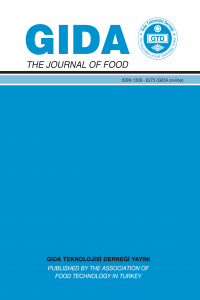Öz
Piyasa
araştırmaları Ülkemizde ekonomik değeri yüksek bitki kaynaklı bazı gıda
bileşenlerinin yerine, hile amacıyla daha ucuz bitkisel ürünlerin
kullanılabildiğini ortaya koymuştur. Bu şekilde yapılan üretimlerde, Antep
fıstığı, kestane ve bademe yönelik tağşişli uygulamalar öne çıkmaktadır. Tüketicilerin korunması
ve haksız rekabetin önlenmesi için bu tür hileli üretimlerin hassas ve
güvenilir metotlar ile tespit
edilmesi gerekmektedir. Bu nedenle bu çalışmada çeşitli gıda ürünlerinde Antep
fıstığı yerine bezelye, kestane yerine fasulye ve badem yerine kayısı
çekirdeğinin hile amaçlı kullanımlarını belirlemek için gerçek zamanlı PZR
TaqMan probe tekniğine dayalı yöntemler geliştirilmiştir. Bu amaçla bezelye ve
fasulye türleri için kloroplast tRNA-Leu (trnL)
geni, kayısı için de kromozomal S14 F-box protein geni üzerinde türe spesifik
primer-prob setleri dizayn edilmiştir. Dizayn edilen primer-prob setleri
kullanılarak gerçekleştirilen gerçek zamanlı PZR reaksiyonlarında, kayısı
çekirdeğinin %0.1, bezelyenin %0.01 ve fasulyenin ise %0.001 seviyesine kadar
diğer bitki türleri ile çapraz reaksiyon olmaksızın tespit edilebileceği ortaya
konulmuştur. Diğer taraftan geliştirilen yöntemlerin, Antep fıstığı-bezelye,
kestane-fasulye ve badem-kayısı çekirdeğinden oluşan ikili karışımlarda da
başarılı sonuçlar verdiği belirlenmiştir. Sonuç olarak, bezelye, fasulye ve
kayısı çekirdeğinin hassas ve güvenilir şekilde tespitine yönelik olarak
geliştirilen yöntemlerin, bu bitki türlerinin hile amaçlı kullanımlarının
belirlenmesi için yapılan rutin kontrollerde başarılı bir şekilde
kullanılabileceği sonucuna varılmıştır.
Anahtar Kelimeler
Kaynakça
- Şenöz, B. (2013). Gıdalarda yapılan taklit/ tağşişler ve gıdaların coğrafi kökeninin tespitinde analiz yöntemlerinin yeri. 8. Gıda Mühendisliği Kongresi Sunumları. http://www.gidamuhendisligikongresi.org/images/onuc/dda6cea62dfe385.pdf (Erişim tarihi 18 Kasım 2016).
- Kardelen Kestane Şekeri (2015). Ucuz kestane şekerinin içeriği ortaya çıkacak. http://www.kardelen.com/detay?q=47 (Erişim tarihi 27 Kasım 2016).
- Ankara Ticaret Odası (2005). Sahte Türkiye raporu. http://www.atonet.org.tr/yeni/index. php?p=269&l=1 (Erişim tarihi 14 Kasım 2016).
- Kalkınma Bakanlığı (2014). Gıda ürünleri ve güvenilirliği. T.C. Kalkınma Bakanlığı, Onuncu Kalkınma Planı (2014-2018), Özel İhtisas Komisyonu Raporu, s. 41. Ankara
- Özatay Ş. (2012). Moleküler metotların gıda kontrollerindeki uygulama alanları. Türk Bil. Der. Derg., 5: 75-81, ISSN: 1308-0040.
- Güllüce, A., Kesmen, Z. (2013). Real-time PCR tekniği ve gıda analizlerinde kullanımı. Gıda Teknolojisi, 17: 84-88.
- Ma, H., Shieh, K.J., Chen, G., Qiao, Xt., Chuang, M.Y. (2006). Application of real time polymerase chain reaction (RT-PCR). J Am Sci, 2: 1-15, ISSN 1545-1003
- Wolf, C., Lüthy, J. (2001). Quantitative competitive (QC) PCR for quantification of porcine DNA. Meat Sci, 57: 161-168. doi: 10.1016/S0309-1740(00)00088-7.
- Arlorio, M., Cereti, E., Coïsson, J.D., Travaglia, F., Martelli, A. (2007). Detection of hazelnut (Corylus spp.) in processed foods using real-time PCR. Food Control, 18: 140-148. doi:10.1016/j.foodcont.2005.09.005.
- Demmel, A., Hupfer, C., Busch, U., Engel, K.H. (2011). Detection of lupine (Lupinus spp.), DNA in processed foods using real-time PCR. Food Control, 22: 215-220. doi:10.1016/j.foodcont.2010.07.001.
DETECTION OF FRAUDULENT PRACTICES INVOLVING SOME PLANT DERIVED COMPOUNDS IN FOODS USING REAL-TIME PCR
Öz
In this country, market research have revealed that there has been
adulteration in food products in which some plant species have been replaced
with plant ingredients that have a lower economic value. Fraudulent practices
involving pistachios, chestnuts and almonds are prominent among these
activities. For the protection of consumers and to prevent unfair competition
in the market, the detection of fraudulent practices is required with precise
and reliable methods. In this study, a new method based on the real- time PCR
TaqMan probe technique was developed to determine the fraudulent use of pea
instead of pistachio, apricot kernel instead of almond and common bean instead
of chestnut in some food products. For this purpose, species-specific primer
and probe sets were designed on the chloroplast tRNA-Leu (trnL) gene for pea and bean and also on the nuclear S14 F- box
protein gene for apricot. In the real-time PCR reactions performed with the
designed species specific primer and probe sets, apricot could be detected at
the level of 0.1%, pea at the level of 0.01% and bean at the level of 0.001%,
quantitatively, without any cross-reactivity with other plant species examined.
Additionally, the developed method also provided successful detection in binary
mixtures of the plants: pistachio-pea, chestnut-bean and apricot kernel-almond.
As a result, it was concluded that the method provided a sensitive and reliable
detection method for pea, bean and apricot kernel residues in foods, and it can
successfully be used in the routine control of fraudulent practices involving
these plant species in food products.
Anahtar Kelimeler
Kaynakça
- Şenöz, B. (2013). Gıdalarda yapılan taklit/ tağşişler ve gıdaların coğrafi kökeninin tespitinde analiz yöntemlerinin yeri. 8. Gıda Mühendisliği Kongresi Sunumları. http://www.gidamuhendisligikongresi.org/images/onuc/dda6cea62dfe385.pdf (Erişim tarihi 18 Kasım 2016).
- Kardelen Kestane Şekeri (2015). Ucuz kestane şekerinin içeriği ortaya çıkacak. http://www.kardelen.com/detay?q=47 (Erişim tarihi 27 Kasım 2016).
- Ankara Ticaret Odası (2005). Sahte Türkiye raporu. http://www.atonet.org.tr/yeni/index. php?p=269&l=1 (Erişim tarihi 14 Kasım 2016).
- Kalkınma Bakanlığı (2014). Gıda ürünleri ve güvenilirliği. T.C. Kalkınma Bakanlığı, Onuncu Kalkınma Planı (2014-2018), Özel İhtisas Komisyonu Raporu, s. 41. Ankara
- Özatay Ş. (2012). Moleküler metotların gıda kontrollerindeki uygulama alanları. Türk Bil. Der. Derg., 5: 75-81, ISSN: 1308-0040.
- Güllüce, A., Kesmen, Z. (2013). Real-time PCR tekniği ve gıda analizlerinde kullanımı. Gıda Teknolojisi, 17: 84-88.
- Ma, H., Shieh, K.J., Chen, G., Qiao, Xt., Chuang, M.Y. (2006). Application of real time polymerase chain reaction (RT-PCR). J Am Sci, 2: 1-15, ISSN 1545-1003
- Wolf, C., Lüthy, J. (2001). Quantitative competitive (QC) PCR for quantification of porcine DNA. Meat Sci, 57: 161-168. doi: 10.1016/S0309-1740(00)00088-7.
- Arlorio, M., Cereti, E., Coïsson, J.D., Travaglia, F., Martelli, A. (2007). Detection of hazelnut (Corylus spp.) in processed foods using real-time PCR. Food Control, 18: 140-148. doi:10.1016/j.foodcont.2005.09.005.
- Demmel, A., Hupfer, C., Busch, U., Engel, K.H. (2011). Detection of lupine (Lupinus spp.), DNA in processed foods using real-time PCR. Food Control, 22: 215-220. doi:10.1016/j.foodcont.2010.07.001.
Ayrıntılar
| Bölüm | Makaleler |
|---|---|
| Yazarlar | |
| Yayımlanma Tarihi | 4 Mayıs 2017 |
| Yayımlandığı Sayı | Yıl 2017 Cilt: 42 Sayı: 3 |


